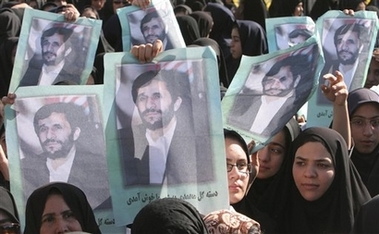TEHRAN, Iran - Iran's hardline president on Sunday said his country was
determined to expand its uranium enrichment program, announcing a plan to
produce more nuclear fuel and calling allegations that Tehran was seeking
nuclear weapons a "big lie."
Speaking to professors at Tehran University, President Mahmoud Ahmadinejad
reinforced his rejection of demands by the US and its allies to stop enrichment,
saying his country was committed to generating nuclear fuel for electricity.
|

Iranian women hold posters of Iran's President Mahmoud
Ahmadinejad during a public gathering in the city of Karaj, 21 miles (35
kilometers), west of the capital Tehran, Iran, Thursday, Sept. 28, 2006.
Ahmadinejad on Thursday rejected demands that Tehran suspend its uranium
enrichment activities, saying his government was determined to continue
pursuing nuclear energy for peaceful purposes.
[AP]
|
"Allegations or charges by the United States than Iran is seeking nuclear
weapons is a big lie," Ahmadinejad said during his speech, which was broadcast
on state-run television.
The process of uranium enrichment can be used to produce electricity or build
nuclear weapons depending on the level of enrichment. The U.S. alleges Iran is
seeking to build nuclear weapons, but Iran contends that its program is for
peaceful purposes.
Ahmadinejad said in his speech that Iran will hopefully install up to 100,000
centrifuges, which spin uranium gas into enriched material in order to produce
nuclear fuel. He did not provide any more details or set a timeline, but
installing so many centrifuges could take several years.
In February, Iran announced for the first time that it produced a batch of
low-enriched uranium, using 164 centrifuges.
It also has said it plans to intall 3,000 centrifuges by the end of the year
at its uranium enrichment plant in the central Iranian town of Natanz.
Large-scale production of enriched uranium in Natanz would require 54,000
centrifuges.
The speech Sunday was one of several lately in which Ahmadinejad has said
Iran will not give up its right under the Nuclear Nonproliferation Treaty to
enrich uranium to produce nuclear fuel and won't consider suspending it, even
for a day.
"Not a single person has a right to give up the rights of the Iranian
nation," he said.
Iran has been locked in a battle with the United States and some of its
allies over its nuclear program. Tehran defied a U.N. Security Council deadline
calling on it to suspend enrichment by Aug. 31 or face possible international
sanctions.
But talks between Iranian and European officials have continued over a
package of incentives that six countries ¡ª the United States, China, Russia,
France, Britain and Germany ¡ª are offering Tehran in return for suspending its
enrichment program and returning to full-scale negotiations.
Last week, envoys ended two days of talks in Berlin with no agreement on the
enrichment issue but insisted they had "come to some positive conclusions" on
ways to open broader discussions.